牛津译林版七年级英语下册Unit 5 Amazing things Reading A 课件(23张PPT)
文档属性
| 名称 | 牛津译林版七年级英语下册Unit 5 Amazing things Reading A 课件(23张PPT) |
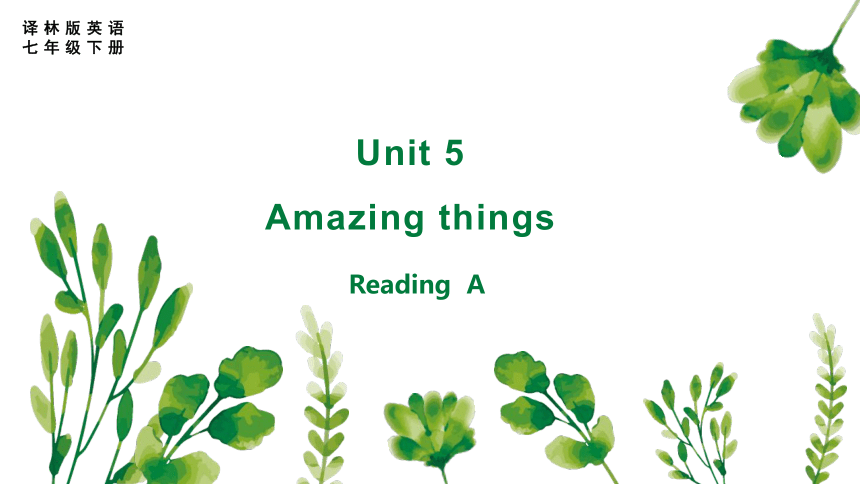
|
|
| 格式 | pptx | ||
| 文件大小 | 3.4MB | ||
| 资源类型 | 教案 | ||
| 版本资源 | 牛津译林版 | ||
| 科目 | 英语 | ||
| 更新时间 | 2022-02-20 00:00:00 | ||
图片预览

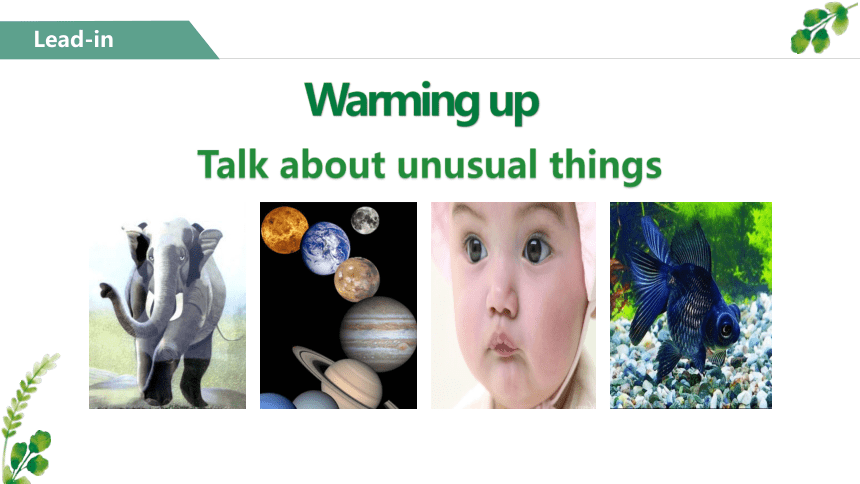
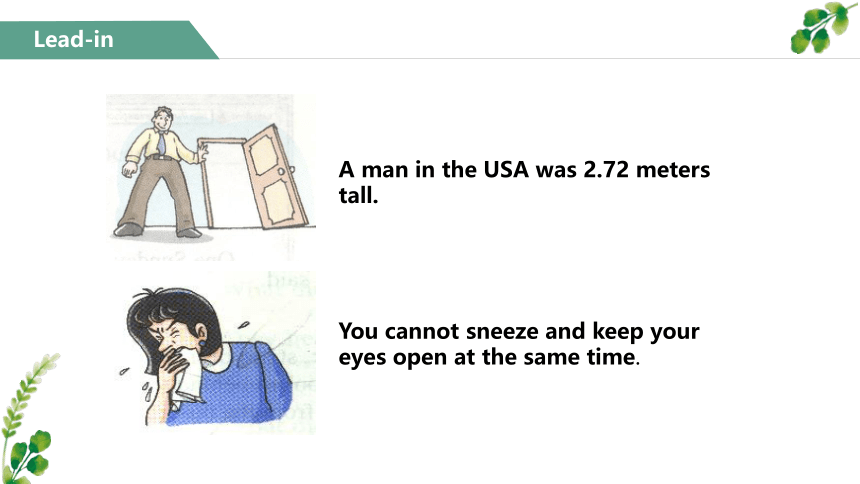
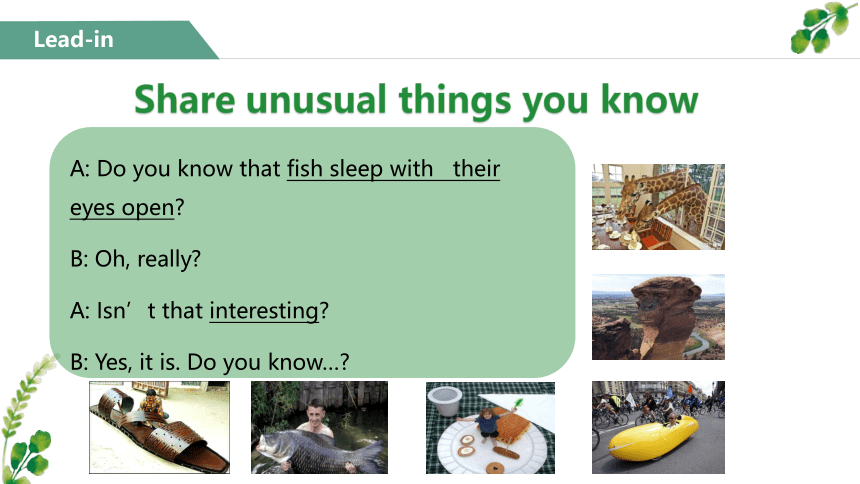
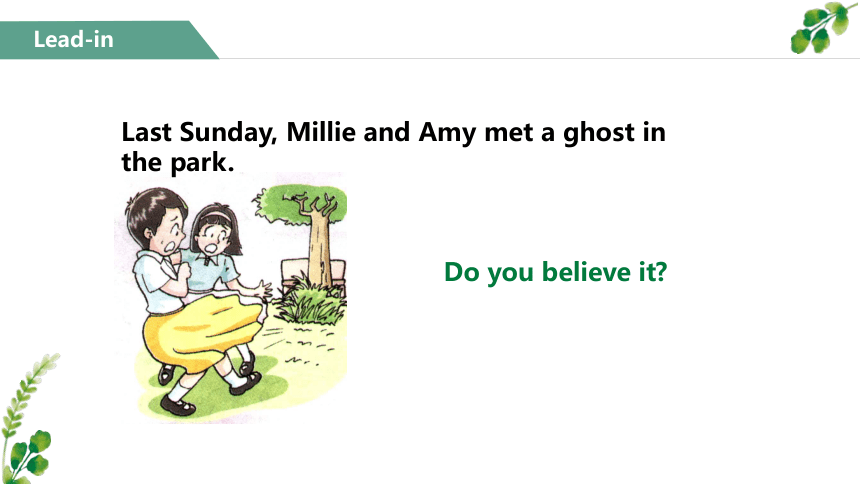
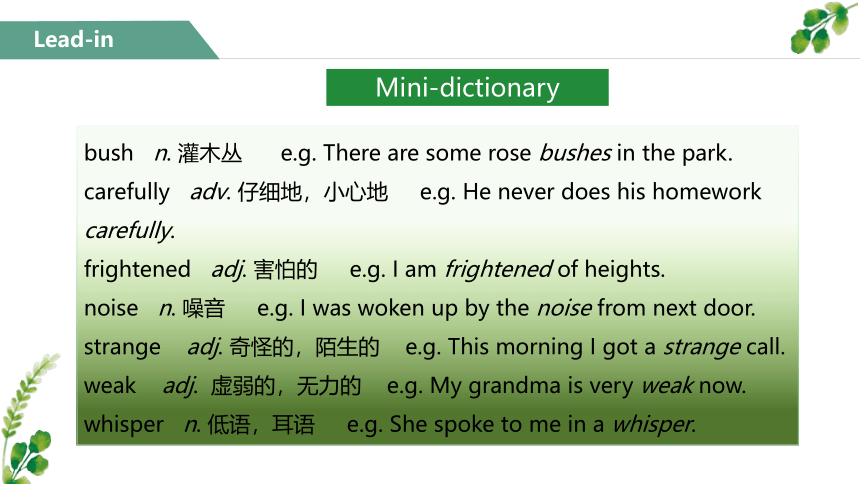
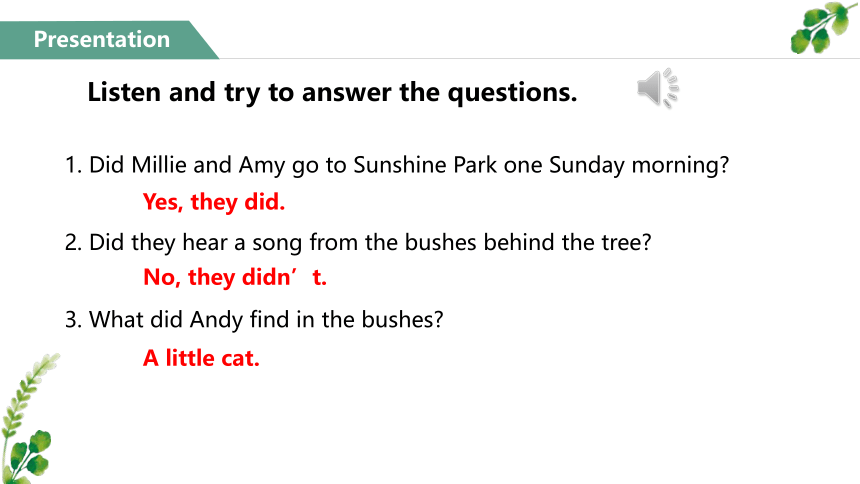
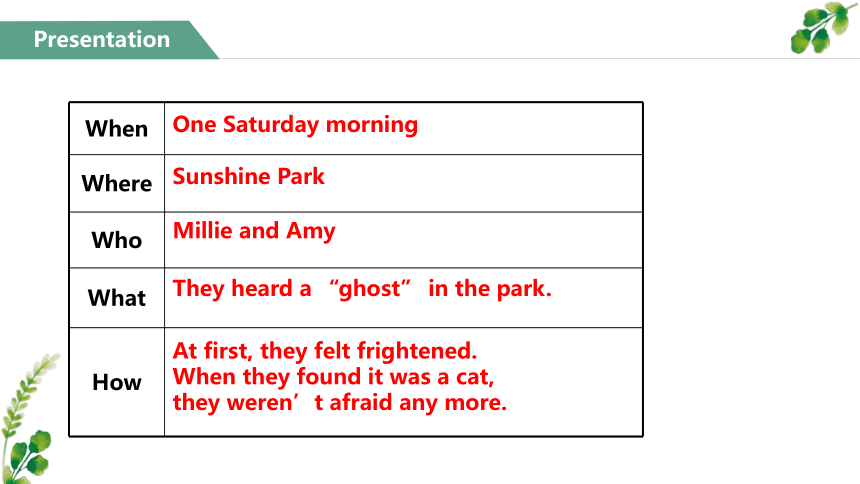
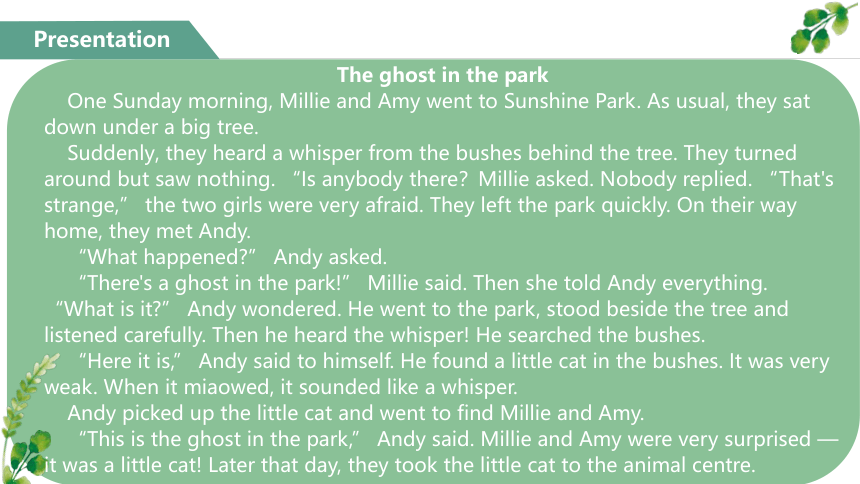
文档简介
(共23张PPT)
译林版英语七年级下册
Unit 5
Amazing things
Reading A
Lead-in
Warming up
Talk about unusual things
Lead-in
A man in the USA was 2.72 meters tall.
You cannot sneeze and keep your eyes open at the same time.
Lead-in
A: Do you know that fish sleep with their eyes open
B: Oh, really
A: Isn’t that interesting
B: Yes, it is. Do you know…
Share unusual things you know
Lead-in
Last Sunday, Millie and Amy met a ghost in the park.
Do you believe it
Lead-in
Mini-dictionary
bush n. 灌木丛 e.g. There are some rose bushes in the park.
carefully adv. 仔细地,小心地 e.g. He never does his homework carefully.
frightened adj. 害怕的 e.g. I am frightened of heights.
noise n. 噪音 e.g. I was woken up by the noise from next door.
strange adj. 奇怪的,陌生的 e.g. This morning I got a strange call.
weak adj. 虚弱的,无力的 e.g. My grandma is very weak now.
whisper n. 低语,耳语 e.g. She spoke to me in a whisper.
Presentation
1. Did Millie and Amy go to Sunshine Park one Sunday morning
2. Did they hear a song from the bushes behind the tree
3. What did Andy find in the bushes
Yes, they did.
No, they didn’t.
A little cat.
Listen and try to answer the questions.
Presentation
When
Where
Who
What
How
One Saturday morning
Sunshine Park
Millie and Amy
They heard a “ghost” in the park.
At first, they felt frightened. When they found it was a cat, they weren’t afraid any more.
Presentation
The ghost in the park
One Sunday morning, Millie and Amy went to Sunshine Park. As usual, they sat down under a big tree.
Suddenly, they heard a whisper from the bushes behind the tree. They turned around but saw nothing. “Is anybody there?Millie asked. Nobody replied. “That's strange,” the two girls were very afraid. They left the park quickly. On their way home, they met Andy.
“What happened ” Andy asked.
“There's a ghost in the park!” Millie said. Then she told Andy everything. “What is it ” Andy wondered. He went to the park, stood beside the tree and listened carefully. Then he heard the whisper! He searched the bushes.
“Here it is,” Andy said to himself. He found a little cat in the bushes. It was very weak. When it miaowed, it sounded like a whisper.
Andy picked up the little cat and went to find Millie and Amy.
“This is the ghost in the park,” Andy said. Millie and Amy were very surprised —it was a little cat! Later that day, they took the little cat to the animal centre.
Presentation
1. Why were Millie and Amy frightened
They heard a whisper from the bushes behind the tree.
2. Who did they meet on their way home
They met Andy.
3. Where did Andy find the “ghost” How did he find it
In the bushes. He searched the bushes and found it.
4. Why did the cat sound like a ghost
Because it was very weak.
5. Where did they take the cat
They took it to the animal centre.
Further reading
Presentation
Key words and phrases:
chat / a whisper / bush / nothing / afraid / run away / tell / search / weak / surprised / later that day / animal centre
Try to retell the story
Language Points
as usual 像往常一样
1
eg:As usual, he goes to work by bike. 像往常一样,他骑自行车去上班了。
考向一
形容词usual的反义词为unusual,意为“不寻常的,不平常的”。由于unusual是以元音音素开头的词,作单数可数名词的定语,表泛指时,前面需用不定冠词an。
考向二
usual的副词为usually,意为“通常”,表示频度。
eg:He usually goes to the park on Saturday morning. 他通常星期六早晨去公园。
eg:It was a usual day, but I met an unusual man.
那是很平常的一天,但是我遇到一个不寻常的人。
Language Points
leave /li v/ v. 离开
2
考向一
[辨析] leave与leave for
eg:When does the train leave 火车什么时候离开?
leave+地点 表示“离开某地” He will leave Beijing tomorrow.
他明天要离开北京。
leave for+地点 表示“前往某地” Sandy will leave for Beijing tonight.桑迪今晚将前往北京。
eg:My mother often leaves her bag in her office.
我妈妈经常把她的包落在她的办公室里。
考向二
“leave sth.+地点状语”意为“把某物落在某地”。
Language Points
考向三
[辨析] leave与forget
leave 指因粗心而没带某物或把某物落在某处,其后往往有一个地点状语。 I left my keys at home.
我把钥匙落在家里了。
forget 指大脑不能记起或回忆不起过去的人、物或事情,其反义词为remember。 I forgot his name.
我忘记了他的名字。
Language Points
on one's way 在路上;在途中
3
eg:On my way, I saw the accident. 在路上,我看到了那场事故。
考向一
on one's way中的形容词性物主代词要和主语保持一致。如不强调某人时,也可用on the way。
考向二
on one’s way后可跟“to+地点名词”,意为“在某人去……的路上”;若后接here,there,home等地点副词时,要省略介词to。
eg:On her way to school, she bought some flowers.
她在去学校的路上买了一些花。
Tom hurt his leg on his way home. 汤姆在回家的路上伤了腿。
eg:She didn’t see anybody on the way. 在路上她一个人也没看见。
Language Points
happen /'h p n/ vi.发生
4
eg:What happened to him last week 上周他发生了什么事?
考向一
不及物动词happen指那些偶然的或不能预见的事“发生”。
常用结构:
a) sth. happen(s) to sb.,意为“某事发生在某人身上”。
eg:It's the best thing that has ever happened to me.
这是我所遇到的最好的事。
b) happen to do sth. 碰巧做某事
eg:I happened to meet my history teacher in the street yesterday.
昨天在街上我碰巧遇见了我的历史老师。
Language Points
考向二
[辨析]happen与take place
happen 用来强调某事发生的偶然性。 A car accident happened in that street last night.
昨晚那条街上发生了一起车祸。
take place 表示事先有安排或有准备地“发生,举行”。 A sports meeting took place in our school last week.
上周我们学校举办了运动会。
Language Points
pick /p k/ vt. 拾起;挑选
5
考向
常用搭配:pick up 拿起,拾起,pick up为动词加副词形式,当宾语为代词时应放在中间;当宾语为名词时,既可放中间也可放后面。
eg:Look, the book is on the ground. Please pick it up.
瞧,书在地上,请把它捡起来。
Can you help me pick up the pen / pick the pen up
你能帮我把钢笔捡起来吗?
Language Points
say to oneself 自言自语,心中暗想
6
反身代词oneself表示“某人自己”,第一二人称的形容词性物主代词和第三人称人称代词宾格加后缀-self / -selves构成:
eg:“Where is my book ” Peter says to himself.
“我的书在哪儿 ”彼得自言自语道。
考向
单数 myself yourself himself / herself / itself
复数 ourselves yourselves themselves
拓展
hurt oneself 伤着自己 help oneself 随便吃;随便用
teach oneself 自学 enjoy oneself 过得愉快
by oneself 单独地;独自地
Language Points
surprised /s 'pra zd / adj. 吃惊的,惊讶的
7
形容词surprised常用来形容人的感受,常用结构:be surprised at“对……感到惊讶”;be surprised to do sth.“做某事很惊讶”;be surprised that...“(对某个事实或事件)感到惊讶”。
eg:I'm very surprised to see you here. 我万万没想到能在这儿碰见你。
考向一
eg:We are surprised at his big nose. 我们对他的大鼻子感到惊讶。
She is surprised that her mother has made a big cake for her.
她很惊讶她妈妈给她做了一个大蛋糕。
Language Points
[辨析]surprised与surprising
考向二
surprised 常用来表达人的感受,意为“惊讶的”,主语通常是人。 We are surprised to hear the news.
听到这个消息我们感到惊讶。
surprising 常用来表达事物的特点,意为“令人惊讶的”,主语通常是事或物。 Is there anything surprising about it 关于它有什么令人吃惊的吗?
Language Points
surprised的名词为surprise,意为“惊奇;惊讶”。固定结构:to one's surprise “使某人惊讶的是”;in surprise“惊奇地”。
eg:To my surprise, the plan succeeded. 使我吃惊的是,这个计划成功了。
考向三
拓展
以 -ed形式结尾的词通常用作表语,常用来形容人的感觉;而以 -ing形式结尾的词通常既可用作表语,也可用作定语,常用来修饰事或物。
eg:interested 感兴趣的 — interesting 有趣的
excited 感到兴奋的 — exciting 令人兴奋的
bored 感到厌烦的 — boring 令人厌烦的
tired 感到疲倦的 — tiring 令人疲倦的
Thank you!
译林版英语七年级下册
Unit 5
Amazing things
Reading A
Lead-in
Warming up
Talk about unusual things
Lead-in
A man in the USA was 2.72 meters tall.
You cannot sneeze and keep your eyes open at the same time.
Lead-in
A: Do you know that fish sleep with their eyes open
B: Oh, really
A: Isn’t that interesting
B: Yes, it is. Do you know…
Share unusual things you know
Lead-in
Last Sunday, Millie and Amy met a ghost in the park.
Do you believe it
Lead-in
Mini-dictionary
bush n. 灌木丛 e.g. There are some rose bushes in the park.
carefully adv. 仔细地,小心地 e.g. He never does his homework carefully.
frightened adj. 害怕的 e.g. I am frightened of heights.
noise n. 噪音 e.g. I was woken up by the noise from next door.
strange adj. 奇怪的,陌生的 e.g. This morning I got a strange call.
weak adj. 虚弱的,无力的 e.g. My grandma is very weak now.
whisper n. 低语,耳语 e.g. She spoke to me in a whisper.
Presentation
1. Did Millie and Amy go to Sunshine Park one Sunday morning
2. Did they hear a song from the bushes behind the tree
3. What did Andy find in the bushes
Yes, they did.
No, they didn’t.
A little cat.
Listen and try to answer the questions.
Presentation
When
Where
Who
What
How
One Saturday morning
Sunshine Park
Millie and Amy
They heard a “ghost” in the park.
At first, they felt frightened. When they found it was a cat, they weren’t afraid any more.
Presentation
The ghost in the park
One Sunday morning, Millie and Amy went to Sunshine Park. As usual, they sat down under a big tree.
Suddenly, they heard a whisper from the bushes behind the tree. They turned around but saw nothing. “Is anybody there?Millie asked. Nobody replied. “That's strange,” the two girls were very afraid. They left the park quickly. On their way home, they met Andy.
“What happened ” Andy asked.
“There's a ghost in the park!” Millie said. Then she told Andy everything. “What is it ” Andy wondered. He went to the park, stood beside the tree and listened carefully. Then he heard the whisper! He searched the bushes.
“Here it is,” Andy said to himself. He found a little cat in the bushes. It was very weak. When it miaowed, it sounded like a whisper.
Andy picked up the little cat and went to find Millie and Amy.
“This is the ghost in the park,” Andy said. Millie and Amy were very surprised —it was a little cat! Later that day, they took the little cat to the animal centre.
Presentation
1. Why were Millie and Amy frightened
They heard a whisper from the bushes behind the tree.
2. Who did they meet on their way home
They met Andy.
3. Where did Andy find the “ghost” How did he find it
In the bushes. He searched the bushes and found it.
4. Why did the cat sound like a ghost
Because it was very weak.
5. Where did they take the cat
They took it to the animal centre.
Further reading
Presentation
Key words and phrases:
chat / a whisper / bush / nothing / afraid / run away / tell / search / weak / surprised / later that day / animal centre
Try to retell the story
Language Points
as usual 像往常一样
1
eg:As usual, he goes to work by bike. 像往常一样,他骑自行车去上班了。
考向一
形容词usual的反义词为unusual,意为“不寻常的,不平常的”。由于unusual是以元音音素开头的词,作单数可数名词的定语,表泛指时,前面需用不定冠词an。
考向二
usual的副词为usually,意为“通常”,表示频度。
eg:He usually goes to the park on Saturday morning. 他通常星期六早晨去公园。
eg:It was a usual day, but I met an unusual man.
那是很平常的一天,但是我遇到一个不寻常的人。
Language Points
leave /li v/ v. 离开
2
考向一
[辨析] leave与leave for
eg:When does the train leave 火车什么时候离开?
leave+地点 表示“离开某地” He will leave Beijing tomorrow.
他明天要离开北京。
leave for+地点 表示“前往某地” Sandy will leave for Beijing tonight.桑迪今晚将前往北京。
eg:My mother often leaves her bag in her office.
我妈妈经常把她的包落在她的办公室里。
考向二
“leave sth.+地点状语”意为“把某物落在某地”。
Language Points
考向三
[辨析] leave与forget
leave 指因粗心而没带某物或把某物落在某处,其后往往有一个地点状语。 I left my keys at home.
我把钥匙落在家里了。
forget 指大脑不能记起或回忆不起过去的人、物或事情,其反义词为remember。 I forgot his name.
我忘记了他的名字。
Language Points
on one's way 在路上;在途中
3
eg:On my way, I saw the accident. 在路上,我看到了那场事故。
考向一
on one's way中的形容词性物主代词要和主语保持一致。如不强调某人时,也可用on the way。
考向二
on one’s way后可跟“to+地点名词”,意为“在某人去……的路上”;若后接here,there,home等地点副词时,要省略介词to。
eg:On her way to school, she bought some flowers.
她在去学校的路上买了一些花。
Tom hurt his leg on his way home. 汤姆在回家的路上伤了腿。
eg:She didn’t see anybody on the way. 在路上她一个人也没看见。
Language Points
happen /'h p n/ vi.发生
4
eg:What happened to him last week 上周他发生了什么事?
考向一
不及物动词happen指那些偶然的或不能预见的事“发生”。
常用结构:
a) sth. happen(s) to sb.,意为“某事发生在某人身上”。
eg:It's the best thing that has ever happened to me.
这是我所遇到的最好的事。
b) happen to do sth. 碰巧做某事
eg:I happened to meet my history teacher in the street yesterday.
昨天在街上我碰巧遇见了我的历史老师。
Language Points
考向二
[辨析]happen与take place
happen 用来强调某事发生的偶然性。 A car accident happened in that street last night.
昨晚那条街上发生了一起车祸。
take place 表示事先有安排或有准备地“发生,举行”。 A sports meeting took place in our school last week.
上周我们学校举办了运动会。
Language Points
pick /p k/ vt. 拾起;挑选
5
考向
常用搭配:pick up 拿起,拾起,pick up为动词加副词形式,当宾语为代词时应放在中间;当宾语为名词时,既可放中间也可放后面。
eg:Look, the book is on the ground. Please pick it up.
瞧,书在地上,请把它捡起来。
Can you help me pick up the pen / pick the pen up
你能帮我把钢笔捡起来吗?
Language Points
say to oneself 自言自语,心中暗想
6
反身代词oneself表示“某人自己”,第一二人称的形容词性物主代词和第三人称人称代词宾格加后缀-self / -selves构成:
eg:“Where is my book ” Peter says to himself.
“我的书在哪儿 ”彼得自言自语道。
考向
单数 myself yourself himself / herself / itself
复数 ourselves yourselves themselves
拓展
hurt oneself 伤着自己 help oneself 随便吃;随便用
teach oneself 自学 enjoy oneself 过得愉快
by oneself 单独地;独自地
Language Points
surprised /s 'pra zd / adj. 吃惊的,惊讶的
7
形容词surprised常用来形容人的感受,常用结构:be surprised at“对……感到惊讶”;be surprised to do sth.“做某事很惊讶”;be surprised that...“(对某个事实或事件)感到惊讶”。
eg:I'm very surprised to see you here. 我万万没想到能在这儿碰见你。
考向一
eg:We are surprised at his big nose. 我们对他的大鼻子感到惊讶。
She is surprised that her mother has made a big cake for her.
她很惊讶她妈妈给她做了一个大蛋糕。
Language Points
[辨析]surprised与surprising
考向二
surprised 常用来表达人的感受,意为“惊讶的”,主语通常是人。 We are surprised to hear the news.
听到这个消息我们感到惊讶。
surprising 常用来表达事物的特点,意为“令人惊讶的”,主语通常是事或物。 Is there anything surprising about it 关于它有什么令人吃惊的吗?
Language Points
surprised的名词为surprise,意为“惊奇;惊讶”。固定结构:to one's surprise “使某人惊讶的是”;in surprise“惊奇地”。
eg:To my surprise, the plan succeeded. 使我吃惊的是,这个计划成功了。
考向三
拓展
以 -ed形式结尾的词通常用作表语,常用来形容人的感觉;而以 -ing形式结尾的词通常既可用作表语,也可用作定语,常用来修饰事或物。
eg:interested 感兴趣的 — interesting 有趣的
excited 感到兴奋的 — exciting 令人兴奋的
bored 感到厌烦的 — boring 令人厌烦的
tired 感到疲倦的 — tiring 令人疲倦的
Thank you!
